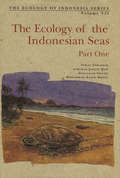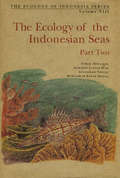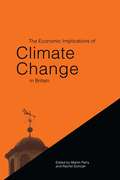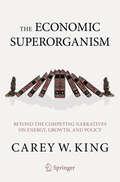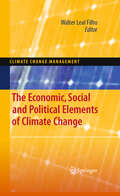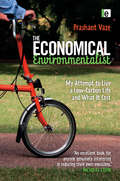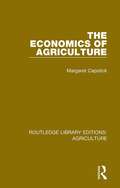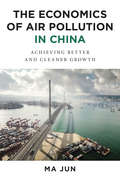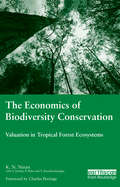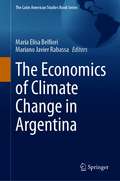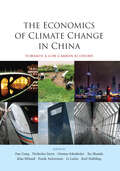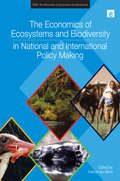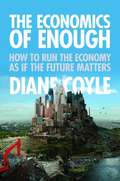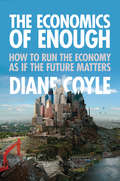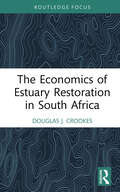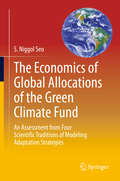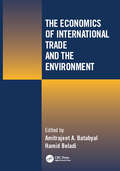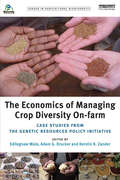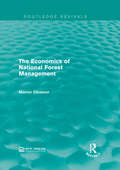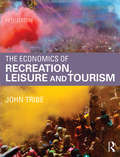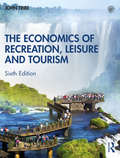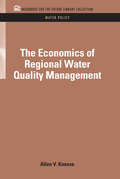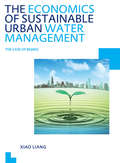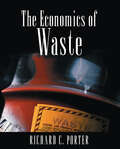- Table View
- List View
The Ecology of the Indonesian Seas Part One
by Mohammad Kasim Moosa Anugerah Nontji Tomas Tomascik Anmarie J. MahThe challenging task of documenting Indonesia's marine realm is presented here in a two-volume set.The first volume provides a review of the geology, physical oceanography and meteorology of the archipelago.The second volume discusses the origins, formation and distribution of various reef types in the Indonesian Archipelago, and provides new estimates on their extent. The second volume also provides a review of the ecology of Indonesian seagrass, mangrove and open-ocean ecosystems. The final two chapters discuss what effects the human race has had on marine resources, and what we can do to protect and preserve our marine and coastal zones for generations to come.
The Ecology of the Indonesian Seas Part Two
by Mohammad Kasim Moosa Anugerah Nontji Tomas Tomascik Anmarie J. MahThe Ecology of the Indonesian Seas distills for the first time the information found in thousands of scholarly works relevant to an understanding of the sustainable use of marine and coastal resources in these islands--many of them available up to now only in Dutch, German or Indonesian.<P><P> It is an invaluable tool for government planners, resource managers, ecologists, university students, scuba divers, and all those with an interest in the sea.The second volume discusses the origins, formation and distribution of various reef types in the Indonesian Archipelago, and provides new estimates on their extent. The second volume also provides a review of the ecology of Indonesian seagrass, mangrove and open-ocean ecosystems. The chapter on marine biodiversity focuses on a number of marine and coastal habitats and threatened marine organisms. The final two chapters discuss what recent effects the human race has had on marine resources, and what we can do to protect and preserve our marine and coastal zones for generations to come.
The Economic Implications of Climate Change in Britain
by Martin ParryClimate change could have a substantial economic impact, particularly on coastal states where seas level rises will be felt most strongly. Among these, the British Isles are likely to be significantly affected, and they provide an excellent case study of the consequences for specific sectors of the economy. In this book, leading experts - including several authors of reports by the Intergovernmental Panel on Climate Change and the UK Climate Change Impacts Review Group - examine the background and alternative scenarios for change, as well as its implications. They look in detail at water supply and management, agriculture and land use, energy, and the finance and insurance sector. In each case, they show how current activities will have to adapt and they conclude by evaluating the arguments for prevention now vs adaptation later. The changes in store could be huge, requiring the attention of academics and professionals from a wide range of disciplines and industries, as well as government action. This book makes a major contribution to understanding what is at stake.
The Economic Superorganism: Beyond the Competing Narratives on Energy, Growth, and Policy
by Carey W. KingEnergy drives the economy, economics informs policy, and policy affects social outcomes. Since the oil crises of the 1970s, pundits have debated the validity of this sequence, but most economists and politicians still ignore it. Thus, they delude the public about the underlying influence of energy costs and constraints on economic policies that address such pressing contemporary issues as income inequality, growth, debt, and climate change. To understand why, Carey King explores the scientific and rhetorical basis of the competing narratives both within and between energy technology and economics. Energy and economic discourse seems to mirror Newton’s 3rd Law of Motion: For every narrative there is an equal and opposite counter-narrative. The competing energy narratives pit "drill, baby, drill!" against renewable technologies such as wind and solar. Both claim to provide secure, reliable, clean, and affordable energy to support economic growth with the most benefit to society, but how? To answer this question, we need to understand the competing economic narratives, techno-optimism and techno-realism. Techno-optimism claims that innovation overcomes any physical resource constraints and enables the social outcomes and economic growth we desire. Techno-realism, in contrast, states that no matter what energy technologies we use, feedbacks from physical growth on a finite planet constrain economic growth and create an uneven distribution of social impacts. In The Economic Superorganism, you will discover stories, data, science, and philosophy to guide you through the arguments from competing narratives on energy, growth, and policy. You will be able to distinguish the technically possible from the socially viable, and understand how our future depends on this distinction.
The Economic, Social and Political Elements of Climate Change
by Walter Leal FilhoA unique feature of this book is its strong practice-oriented nature: it contains a wide range of papers dealing with the social, economic and political aspects of climate change, exemplifying the diversity of approaches to climate change management taking place all over the world, in a way never seen before. In addition, the book describes a number of projects and other initiatives happening in Africa, Asia, Europe, Latin American and the Australasian region, providing a profile of the diversity of works taking place today.
The Economical Environmentalist: My Attempt to Live a Low-Carbon Life and What it Cost
by Prashant VazeReducing your carbon emissions in an economic down-turn can be challenging, but saving the planet doesn't have to cost you more. Tough economic times need not relegate concerns for the planet to the back burner. The author is an environmental economist trying to live a low-carbon life in London. He worked for 15 years in the UK's Office of Climate Change, the Prime Minister's Strategy Unit and the Department of the Environment. So far so good. But he has kids. A family to visit in India. A hectic job. In distilling and building on his own experience of trying to live a low carbon life, he helps us navigate the choices that confront us all - families, singletons, pensioners - when making decisions about what to eat, what to buy, how to travel and how to keep warm in the era of climate change and economic turmoil. He works out the sums and lets us know which choices will make the biggest difference, and which are false savings. His book is an irreverent but seriously rigorous reference guide to low-cost, low-carbon living for everyone - in any location - in tough times. It's brimming with up-to-date information on current and future technologies, tips and ideas for every budget on how to spend the least for the biggest carbon reduction gain and insight from the experiences of people trying to live low-carbon lives.
The Economics of Agriculture (Routledge Library Editions: Agriculture #11)
by Margaret CapstickFirst published in 1970. The aim of this book is to provide an introduction to the special problems of agriculture in modern economies. The author writes for students of economics who have already acquired the elements of economic theory; no attempt is made, therefore, to explain simple theoretical concepts, but instead these are used in the analysis of some of the main problems of agricultural adjustment. Emphasis is placed on the position of agriculture in the economies of western Europe and of the United States. Sufficient historical background is given to explain the present use of the factors of production in agriculture and the way in which this use and policies of agricultural support vary from one country to another. Agricultural support policies are discussed with reference to their effect on consumers, producers and on rural society.
The Economics of Air Pollution in China: Achieving Better and Cleaner Growth
by Jun MaSuffocating smog regularly envelops Chinese metropolises from Beijing to Shanghai, clouding the future prospect of China's growth sustainability. Air pollutants do not discriminate between the rich and the poor, the politician and the "average Joe." They put everyone's health and economic prosperity at risk, creating future costs that are difficult to calculate. Yet many people, including some in China, are concerned that addressing environmental challenges will jeopardize economic growth. In The Economics of Air Pollution in China, leading Chinese economist Ma Jun makes the case that the trade-off between growth and environment is not inevitable. In his ambitious proposal to tackle severe air pollution and drastically reduce the level of so-called PM 2.5 particles—microscopic pollutants that lodge deeply in lungs—Ma Jun argues that in targeting pollution, China has a real opportunity to undertake significant structural economic reforms that would support long-term growth. Rooted in rigorous analyses and evidence-based projections, Ma Jun's "big bang" proposal aims to mitigate pollution and facilitate a transition to a greener and more sustainable growth model.
The Economics of Biodiversity Conservation: Valuation in Tropical Forest Ecosystems
by K.N NinanEconomic valuation of biodiversity and ecosystem services is possibly the most powerful tool for halting the loss of biodiversity while maintaining incomes and livelihoods. Yet rarely have such approaches been applied to tropical forest ?hotspots?, which house the vast majority of the planets plant and animal species. This ground-breaking work is the most comprehensive and detailed examination of the economics of environmental valuation and biodiversity conservation to date. Focusing on the Western Ghats of India, one of the top biodiversity hotspots in the world, this volume looks at a cross-section of local communities living within or near sanctuaries and reserve forests such as coffee growers, indigenous people and farmers-cum-pastoralists to assess the use and non-use values that people derive from tropical forests. It also looks at the extent of their dependence on forests for various goods and services, and examines their perceptions and attitudes towards biodiversity conservation and wildlife protection. The book concludes with an assessment of the institutional alternatives and policies for promoting biodiversity conservation through economic valuation methods. Related titles Economics for Collaborative Environmental Management (2005) 1-84407-095-6
The Economics of Climate Change
by Nicholas SternThere is now clear scientific evidence that emissions from economic activity, particularly the burning of fossil fuels for energy, are causing changes to the Earth's climate. A sound understanding of the economics of climate change is needed in order to underpin an effective global response to this challenge. The Stern Review is an independent, rigourous and comprehensive analysis of the economic aspects of this crucial issue. It has been conducted by Sir Nicholas Stern, Head of the UK Government Economic Service, and a former Chief Economist of the World Bank. The Economics of Climate Change will be invaluable for all students of the economics and policy implications of climate change, and economists, scientists and policy makers involved in all aspects of climate change.
The Economics of Climate Change in Argentina (The Latin American Studies Book Series)
by Maria Elisa Belfiori Mariano Javier RabassaIn this volume, the contributors discuss some of the most remarkable global warming effects in Argentina and examine policies that Latin American countries could follow to achieve their individual climate goals. Climate change is one of the most pressing issues today. However, after many years of climate negotiations, the world has failed to introduce a common global policy. Differences in countries' climate agendas have led to unsuccessful efforts. Countries willing to pursue a climate policy have sought alternative strategies to mitigate and adapt to global warming's consequences within their jurisdiction. In this context, Latin American countries' role in shaping the regional climate agenda is yet to be explored. The book covers some papers from the well-received "First Workshop on Environmental Economics and Energy" in Argentina. Using data from Argentina, the contributors analyze the effects of global warming on agricultural yields and the impact of extreme weather on human health. From a global perspective, the contributors also describe the interactions between a reduction in carbon emissions, carbon emissions intensity, and economic growth; the role that trade policies can play to reduce carbon emissions; and the paradoxes that arise from promoting renewable energies in the region. The contributors also address the relationship between sustainability and economic growth; the private sector's role in shaping policies and providing sustainable solutions; and the Latin American challenges for the next generation. The book will be of interest to policy-makers, academics, researchers, and professionals worldwide working in climate change impacts and policy. It will also appeal to a general audience interested in climate change economics, its consequences, and the steps that countries in Latin America can take to move forward.
The Economics of Climate Change in China: Towards a Low-Carbon Economy
by Nicholas Stern Frank Ackerman Ottmar Edenhofer Fan Gang Xu Shanda Klas Eklund Lailai Li Karl HalldingChina faces many modernization challenges, but perhaps none is more pressing than that posed by climate change. China must find a new economic growth model that is simultaneously environmentally sustainable, can free it from its dependency on fossil fuels, and lift living standards for the majority of its population. But what does such a model look like? And how can China best make the transition from its present macro-economic structure to a low-carbon future? This ground-breaking economic study, led by the Stockholm Environment Institute and the Chinese Economists 50 Forum, brings together leading international thinkers in economics, climate change, and development, to tackle some of the most challenging issues relating to China's low-carbon development. This study maps out a deep carbon reduction scenario and analyzes economic policies that shift carbon use, and shows how China can take strong and decisive action to make deep reductions in carbon emission over the next forty years while maintaining high economic growth and minimizing adverse effects of a low-carbon transition. Moreover, these reductions can be achieved within the finite global carbon budget for greenhouse gas emissions, as determined by the hard constraints of climate science. The authors make the compelling case that a transition to a low-carbon economy is an essential part of China's development and modernization. Such a transformation would also present opportunities for China to improve its energy security and move its economy higher up the international value chain. They argue that even in these difficult economic times, climate change action may present more opportunities than costs. Such a transformation, for China and the rest of the world, will not be easy. But it is possible, necessary and worthwhile to pursue.
The Economics of Ecosystems and Biodiversity in National and International Policy Making (TEEB - The Economics of Ecosystems and Biodiversity)
by Patrick Ten BrinkThe Economics of Ecosystems and Biodiversity (TEEB) study is a major international initiative drawing attention to local, national and global economic benefits of biodiversity, to highlight the growing costs of biodiversity loss and ecosystem degradation, the benefits of investing in natural capital, and to draw together expertise from the fields of science, economics and policy to enable practical actions. Drawing on a team of more than one hundred authors and reviewers, this book demonstrates the value of ecosystems and biodiversity to the economy, society and individuals. It underlines the urgency of strategic policy making and action at national and international levels, and presents a rich evidence base of policies and instruments in use around the world and a wide range of innovative solutions. It highlights the need for new public policy to reflect the appreciation that public goods and social benefits are often overlooked and that we need a transition to decision making which integrates the many values of nature across policy sectors. It explores the range of instruments to reward those offering ecosystem service benefits, such as water provision and climate regulation. It looks at fiscal and regulatory instruments to reduce the incentives of those running down our natural capital, and at reforming subsidies such that they respond to current and future priorities. The authors also consider two major areas of investment in natural capital - protected areas and investment in restoration. Overall the book underlines the needs and ways to transform our approach to natural capital, and demonstrates how we can practically take into account the value of ecosystems and biodiversity in policy decisions - at national and international levels - to promote the protection of our environment and contribute to a sustainable economy and to the wellbeing of societies.
The Economics of Enough: How to Run the Economy As If the Future Matters
by Diane CoyleThe world's leading economies are facing not just one but many crises. The financial meltdown may not be over, climate change threatens major global disruption, economic inequality has reached extremes not seen for a century, and government and business are widely distrusted. At the same time, many people regret the consumerism and social corrosion of modern life. What these crises have in common, Diane Coyle argues, is a reckless disregard for the future--especially in the way the economy is run. How can we achieve the financial growth we need today without sacrificing a decent future for our children, our societies, and our planet? How can we realize what Coyle calls "the economics of enough"? Running the economy for tomorrow as well as today will require a wide range of policy changes. The top priority must be ensuring that we get a true picture of long-term economic prospects, with the development of official statistics on national wealth in its broadest sense, including natural and human resources. Saving and investment will need to be encouraged over current consumption. Above all, governments will need to engage citizens in a process of debate about the difficult choices that lie ahead and rebuild a shared commitment to the future of our societies. Creating a sustainable economy--having enough to be happy without cheating the future--won't be easy. But The Economics of Enough starts a profoundly important conversation about how we can begin--and the first steps we need to take.
The Economics of Enough: How to Run the Economy as If the Future Matters
by Diane CoyleThe world's leading economies are facing not just one but many crises. The financial meltdown may not be over, climate change threatens major global disruption, economic inequality has reached extremes not seen for a century, and government and business are widely distrusted. At the same time, many people regret the consumerism and social corrosion of modern life. What these crises have in common, Diane Coyle argues, is a reckless disregard for the future--especially in the way the economy is run. How can we achieve the financial growth we need today without sacrificing a decent future for our children, our societies, and our planet? How can we realize what Coyle calls "the Economics of Enough"? Running the economy for tomorrow as well as today will require a wide range of policy changes. The top priority must be ensuring that we get a true picture of long-term economic prospects, with the development of official statistics on national wealth in its broadest sense, including natural and human resources. Saving and investment will need to be encouraged over current consumption. Above all, governments will need to engage citizens in a process of debate about the difficult choices that lie ahead and rebuild a shared commitment to the future of our societies. Creating a sustainable economy--having enough to be happy without cheating the future--won't be easy. But The Economics of Enough starts a profoundly important conversation about how we can begin--and the first steps we need to take.
The Economics of Estuary Restoration in South Africa (Routledge Focus on Environment and Sustainability)
by Douglas J. CrookesThis book examines the economic costs and benefits of the ecological restoration of estuaries, utilizing case studies from South Africa. Estuaries are important ecosystems from both an ecological and human perspective. Yet, in many parts of the world they are often degraded environments, facing threats from climate change, invasive species, fire and wastewater pollution. While the environmental benefits of restoring degraded environments are well discussed, this book specifically examines the economic benefits of doing so. It applies a cost-benefit analysis, which focuses on a range of key ecosystem services, including human health, fishing value, recreational value and property value. The book utlizes three detailed studies of the Swartkops estuary, the Great Brak estuary and the Knysna estuary in South Africa, but also draws out lessons that can be applied to coastal environments across the world. Overall, this book demonstrates that ecological restoration does pay and that the value of additional ecosystem services gained through restoration far exceeds the costs associated with this restoration process. This book will be of great interest to students and scholars of environmental management and restoration, ecological economics, ecosystem services and environmental conservation.
The Economics of Global Allocations of the Green Climate Fund: An Assessment from Four Scientific Traditions of Modeling Adaptation Strategies
by S. Niggol SeoThis book provides an incisive and economic assessment of the global warming adaptation policy and programs carved out by the United Nations Framework Convention on Climate Change, the Green Climate Fund (GCF), by relying on the four scientific traditions that have been advanced on the economics of adaptation to climate change in agricultural and natural resource enterprises. Substantially expanding and refocusing on the book Micro-behavioral Economics of Global Warming: Modeling Adaptation Strategies in Agricultural and Natural Resource Enterprises published by Springer in 2015, this book elucidates the theories and summarizes the empirical results and predictions from the four traditions of adaptation modelling: a microbehavioral economic model of adaptation, an agronomic-economic modelling, a statistical model of yield/productivity changes, and an ecosystem model of climate change impacts. The four modeling traditions are freshly analyzed and applied to the assessments of the 93+ GCF-funded projects and programs through the end of 2018.
The Economics of International Trade and the Environment
by Amitrajeet A. Batabyal Hamid BeladiIssues related to environmental protection and trade liberalization have moved to the forefront of international policy agendas. The Economics of International Trade and the Environment explores - from an economic standpoint - many of the questions that are germane in increasing our knowledge of environmental policy in the presence of international
The Economics of Managing Crop Diversity On-farm: Case studies from the Genetic Resources Policy Initiative
by Edilegnaw WaleThe purpose of this book is to assess a variety of economic issues as they relate to agro-biodiversity and show how addressing these issues can assist in agro-biodiversity policy-making. This is illustrated using empirical data from some of the countries (Ethiopia, Nepal and Zambia) which are part of the Genetic Resources Policy Initiative. The empirical chapters apply the relevant economic methods, including regression analysis, choice experiments, hedonic pricing, contingent valuation and farm business income analysis. The authors discuss the economics of managing crop diversity on-farm in the context of crop variety attribute preferences, farmers' perception of agro-biodiversity loss, and value addition and marketing of the products of traditional crop varieties. The case studies include detailed analysis of traditional varieties of groundnut, maize, rice, sorghum, and teff. The results are relevant not only to GRPI countries but also to other countries concerned with the sustainable utilization of these resources. Overall, the studies illustrate how genetic resources issues can be integrated into rural development interventions.
The Economics of National Forest Management (Routledge Revivals)
by Marion ClawsonOriginally published in 1976, this title concentrates upon the management of national forests. Using the best data available, Marion Clawson considers all outputs of the national forests and all costs of national forest management to analyse forests from an economics perspective. The Economics of National Forest Management is ideal for policy makers, professional foresters, and students interested in environmental studies.
The Economics of Recreation, Leisure and Tourism
by John TribeOne of the leading texts in the field, The Economics of Recreation, Leisure and Tourism is the ideal introduction to the fundamentals of economics in these industries, helping you to pass an economics module as part of tourism, recreation, events or sport management degrees. It is written in an engaging style that assumes no prior knowledge of economics. It applies economic theory to a range of tourism industry issues at the consumer, business, national and international level by using topical examples to give the theory real-world context. This book is richly illustrated with diagrams, and contains a range of features such as international case studies showcasing current issues, review questions and extracts from journals to aid understanding and further knowledge, as well as new data and statistics. This fifth edition has been revised and updated to include: New content on recent economic data, consumer choice looking at income-leisure decision approaches, growth areas of sports and events, environmental issues, the impact of the global economic crisis and what may happen in the future. Evidence is put forward to provide a sense of the dynamics of world economies. Updated and new international case studies throughout that demonstrate theoretical principles of economics as applied to tourism Updated companion website with PowerPoint slides
The Economics of Recreation, Leisure and Tourism
by John TribeOne of the leading texts in the field, The Economics of Recreation, Leisure and Tourism is the ideal introduction to the fundamentals of economics in these industries, helping you to enjoy and pass an economics module as part of tourism, recreation, events or sport management degrees. International in its outlook, it will equip you with vital skills and knowledge for your future career as well as critical skills to help you understand and help tackle crucial challenges facing the world. It is written in a clear and engaging style that assumes no prior knowledge of economics. It applies economic theory to a range of tourism industry issues at the consumer, business, national and international level by using topical examples to give the theory real-world context. This book is richly illustrated with diagrams and contains a range of features such as international case studies showcasing current issues, review questions and extracts from journals to aid understanding and further knowledge, as well as new data and statistics. It concludes with a powerful critique of traditional economics and a set of twenty-one issues that demand action. This sixth edition has been revised and updated to include: recent and time series international economic data to provide a sense of the dynamics of world economies topical analysis to aid decision making for industry, governments and pressure groups a renewed emphasis on environmental and climate change issues new and revised international case studies that demonstrate theoretical principles of economics as applied to the sector a companion website with PowerPoint slides.
The Economics of Regional Water Quality Management (RFF Water Policy Set)
by Allen V. KneeseFirst Published in 2011. Routledge is an imprint of Taylor & Francis, an informa company.
The Economics of Sustainable Urban Water Management: UNESCO-IHE PhD Thesis
by Xiao LiangRapid population growth, limited water availability, climate variability and environmental pollution together cause a significant challenge to provide sufficient water to urban residents in a sustainable and effective way. Advanced water treatment technology can contribute to the solution of problems physically, but it may not ensure sustainable op
The Economics of Waste (Rff Press Ser.)
by Richard C. PorterIn this concise, engaging, and provocative work, Richard Porter introduces readers to the economic tools that can be applied to problems involved in handling a diverse range of waste products from business and households. Emphasizing the impossibility of achieving a zero-risk environment, Porter focuses on the choices that apply in real world decisions about waste. Acknowledging that effective waste policy integrates knowledge from several disciplines, Porter focuses on the use of economic analysis to reveal the costs of different policies and therefore how much can be done to meet goals to protect human health and the environment. With abundant examples, he considers subjects such as landfills, incineration, and illegal disposal. He discusses the international trade in waste, the costs and benefits of recycling, and special topics such as hazardous materials, Superfund, and nuclear waste. While making clear his belief that not every form of waste presents the same amount of risk, Porter stresses the need for open-minded approaches to developing new policies. For students, policymakers, and general readers, he provides insight and accessibility to a subject that others might leave out-of-sight, out-of-mind, or buried under an impenetrable prose of statistics and jargon.
